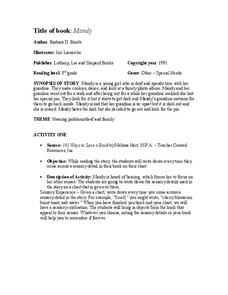Curated OER
Logs, Charts, and Journals: What's On Your Plate?
Have your writers identify and use words that appeal to the senses. They create a chart of sensory words and record some of their favorites, then write a journal entry in which they describe eating at a restaurant using sensory details....
Curated OER
Narratives
Add to the narrative writing experience. Elementary or middle school writers listen to the teacher read a descriptive passage, then reread the same passage silently. They highlight sensory details and figurative language, then orally...
Curated OER
Reading Examples
Young writers read excerpts from Gary Paulsen's memoir to identify figurative and literal language that contain sensory details. They determine which selections are examples of sensory language and fi the language is used literally or...
Curated OER
Sense Poetry
Access your young poets' senses and emotions with this activity, which guides them through the process of writing a "sense poem." After working on a sense poem as a class and modeling the procedure, individuals work on their own poems...
Curated OER
Awesome Animals
Sixth graders write descriptive narratives about animals. In this descriptive writing lesson, the teacher models how to write a paragraph with interesting sensory words and exciting verbs. Students choose a picture of an animal they want...
Curated OER
Breaking the Chains: Rising Out of Circumstances
Study history through photographs. In this visual arts and history lesson, students learn to analyze photographs to discover details about life during the Civil War era. Students write journal entries as if they are the African-American...
Curated OER
Language Arts: Awesome Authors Website
Students examine the writing techniques of professional authors and apply them to their own work. In pairs, they email authors to discover the tricks of the trade. Students create their own Website for their work.
Curated OER
Write, Right
This resource provides the beginning ideas for a lesson on writing a narrative. Learners watch a video, identify story elements, including plot and setting, and then write their own stories. If augmented, this lesson could provide a...
Curated OER
Poetry: What's on Your Plate (Part 2)
Students write a short paragraph using strong descriptions. In this using modifiers lesson, students define modifier, adjective, adverb, metaphor, and simile. Students then write a journal entry in which they write about a...
Curated OER
Lesson Three: Go Free or Die
Fourth graders look for sensory details and figurative language. In this reading strategy lesson, 4th graders read the story Go Free or Die by J. Ferris and complete a chart with figurative language. They use a word wall in the...
Curated OER
Mandy
Third graders read Barbara D. Booth's, "Mandy" while noting each time they read a sensory detail. They read about the young girl in the story who is hard of hearing and determine how her other senses are heightened. Also, they determine...
Curated OER
What's On Your Plate?
Students keep running record of the activities they engage in and the food they eat. In this lesson on healthy living, students discuss the dangers of anorexia and bulimia, record their activity level and food consumption over the course...
Curated OER
What's On Your Plate?
Students explore the use of sensory details in writing. In this journal writing lesson, students write four journal entries after group discussion about a variety of topics such as their weekend, poverty in the United States, and...














